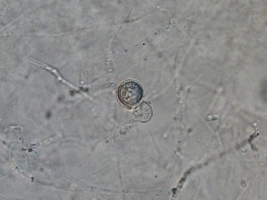Pythium sulcatum
Pythium sulcatum is a species of oomycete that belongs to the genus Pythium. Oomycetes, often referred to as water molds, are fungus-like organisms that play a significant role in the environment as decomposers and pathogens. Pythium sulcatum is particularly known for its pathogenicity in plants, causing diseases that can lead to significant agricultural losses.
Description[edit | edit source]
Pythium sulcatum is characterized by its filamentous growth form, producing hyphae that invade the host plant's tissues. The organism reproduces both sexually, through the formation of oospores, and asexually, via zoospores that are motile in water. These zoospores are crucial for the pathogen's dissemination and infection process, as they can swim towards potential host plants in moist environments.
Pathogenicity[edit | edit source]
The pathogen is notorious for causing root rot in a variety of plants. This disease is particularly detrimental to seedlings, where it can lead to damping-off, a condition where seedlings fail to emerge or collapse shortly after emerging. In mature plants, root rot caused by Pythium sulcatum can lead to stunted growth, wilting, and eventually death if the infection is severe. The pathogen thrives in wet, poorly drained soils, making management of irrigation and soil moisture critical in preventing its spread.
Management[edit | edit source]
Management of Pythium sulcatum involves an integrated approach combining cultural, biological, and chemical strategies. Culturally, improving soil drainage and avoiding overwatering are key in reducing the risk of infection. Crop rotation and the use of resistant plant varieties can also help in managing the disease. Biologically, there are beneficial microorganisms that can suppress Pythium growth and protect plants. Chemically, fungicides may be used, but their application should be carefully managed to avoid resistance development and to minimize environmental impact.
Research[edit | edit source]
Ongoing research on Pythium sulcatum focuses on understanding its biology, epidemiology, and interaction with host plants to develop more effective and sustainable management strategies. Studies on genetic diversity within the species and its resistance mechanisms are particularly important for the development of resistant plant varieties and targeted fungicides.
Transform your life with W8MD's budget GLP1 injections from $125
W8MD offers a medical weight loss program NYC and a clinic to lose weight in Philadelphia. Our W8MD's physician supervised medical weight loss centers in NYC provides expert medical guidance, and offers telemedicine options for convenience.
Why choose W8MD?
- Comprehensive care with FDA-approved weight loss medications including:
- loss injections in NYC both generic and brand names:
- weight loss medications including Phentermine, Qsymia, Diethylpropion etc.
- Accept most insurances for visits or discounted self pay cost.
- Generic weight loss injections starting from just $125.00 for the starting dose
- In person weight loss NYC and telemedicine medical weight loss options in New York city available
- Budget GLP1 weight loss injections in NYC starting from $125.00 biweekly with insurance!
Book Your Appointment
Start your NYC weight loss journey today at our NYC medical weight loss, and Philadelphia medical weight loss Call (718)946-5500 for NY and 215 676 2334 for PA
Search WikiMD
Ad.Tired of being Overweight? Try W8MD's NYC physician weight loss.
Semaglutide (Ozempic / Wegovy and Tirzepatide (Mounjaro / Zepbound) available. Call 718 946 5500.
Advertise on WikiMD
|
WikiMD's Wellness Encyclopedia |
| Let Food Be Thy Medicine Medicine Thy Food - Hippocrates |
Translate this page: - East Asian
中文,
日本,
한국어,
South Asian
हिन्दी,
தமிழ்,
తెలుగు,
Urdu,
ಕನ್ನಡ,
Southeast Asian
Indonesian,
Vietnamese,
Thai,
မြန်မာဘာသာ,
বাংলা
European
español,
Deutsch,
français,
Greek,
português do Brasil,
polski,
română,
русский,
Nederlands,
norsk,
svenska,
suomi,
Italian
Middle Eastern & African
عربى,
Turkish,
Persian,
Hebrew,
Afrikaans,
isiZulu,
Kiswahili,
Other
Bulgarian,
Hungarian,
Czech,
Swedish,
മലയാളം,
मराठी,
ਪੰਜਾਬੀ,
ગુજરાતી,
Portuguese,
Ukrainian
Medical Disclaimer: WikiMD is not a substitute for professional medical advice. The information on WikiMD is provided as an information resource only, may be incorrect, outdated or misleading, and is not to be used or relied on for any diagnostic or treatment purposes. Please consult your health care provider before making any healthcare decisions or for guidance about a specific medical condition. WikiMD expressly disclaims responsibility, and shall have no liability, for any damages, loss, injury, or liability whatsoever suffered as a result of your reliance on the information contained in this site. By visiting this site you agree to the foregoing terms and conditions, which may from time to time be changed or supplemented by WikiMD. If you do not agree to the foregoing terms and conditions, you should not enter or use this site. See full disclaimer.
Credits:Most images are courtesy of Wikimedia commons, and templates, categories Wikipedia, licensed under CC BY SA or similar.
Contributors: Prab R. Tumpati, MD




